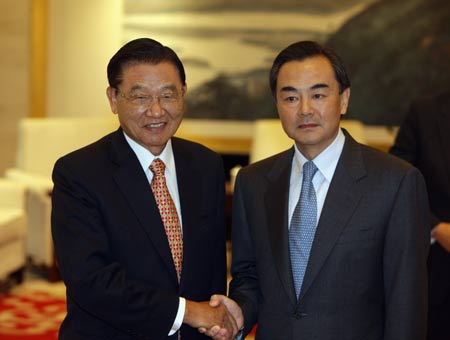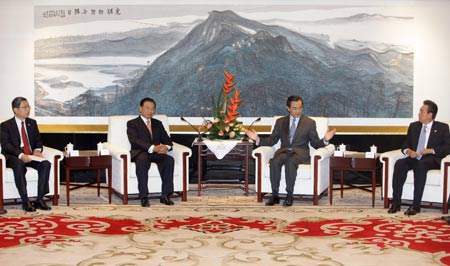NANJING, April 26 (Xinhua) -- Economic cooperation is the priority of the Chinese mainland-Taiwan relations at present and in the near future, said the mainland's Taiwan affairs chief Wang Yi on Sunday.
Wang, director of the Taiwan Work Office of the Communist Party of China (CPC) Central Committee, made the remarks when he met with Chiang Pin-Kung and his negotiating delegation from the Taiwan-based Straits Exchange Foundation (SEF).

Wang Yi (R), director of the Taiwan Work Office of the Central Committee of the Communist Party of China, meets with Taiwan-based Straits Exchange Foundation (SEF) Chairman Chiang Pin-kung in Nanjing, capital of east China's Jiangsu Province, April 26, 2009. (Xinhua/Xing Guangli)
Wang said the three agreements and one consensus reached during this round of talks between the mainland's Association for Relations Across the Taiwan Straits (ARATS) and the SEF indicate new progress of cross-Strait talks and "new achievement" in cross-Strait relations.
During the talks here Sunday, the ARATS and the SEF signed three agreements on launching regular flights and boosting cooperation in finance and handling criminal proceedings.
They also reached a consensus on allowing mainland companies to invest in Taiwan.
"The goal of economic normalization between the two sides is being realized," said Wang, also director of the State Council Taiwan Affairs Office.

Wang Yi (2nd R), director of the Taiwan Work Office of the Central Committee of the Communist Party of China, meets with Taiwan-based Straits Exchange Foundation (SEF) Chairman Chiang Pin-kung (2nd L) in Nanjing, capital of east China's Jiangsu Province, April 26, 2009. (Xinhua/Xing Guangli)
However, promoting peaceful development of cross-straits relations "could neither be accomplished in a single action, nor through an always plain sailing process," he said.
"The two sides should seek step-by-step and comprehensive development of cross-straits relations by putting economy first, and gradually tackle difficult problems on the basis of mutual trust," he said.
He hoped the two sides to boost institutionalization of cross-straits economic relations as soon as possible, including inking an agreement on cross-straits economic cooperation.
The two sides should also enhance exchanges in culture, education, science and technology, and between teenagers on both sides of the Taiwan Straits, he said, to boost mutual understanding and pave way for further development of cross-strait ties.
Wang warned that there were still inherent contradictions, differences, and sensitive political and military issues in cross-straits relations.
"We should in fair weather prepare for foul, and gradually accumulate consensus and create favorable conditions for solving these complicated and sensitive issues," he said.
Fostering mutual trust was the most important factor among others, he said, noting that the basis of mutual trust was opposing "Taiwan independence" and adhering to the "1992 Consensus".